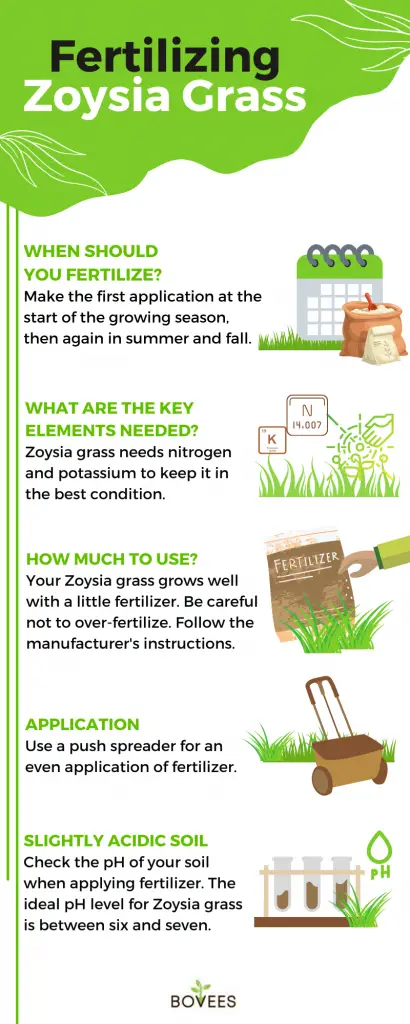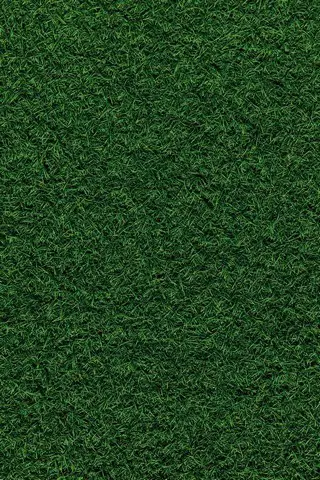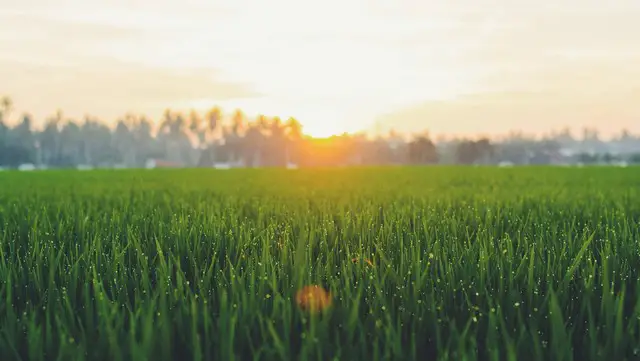Last Updated on January 16, 2023 by Grow with Bovees
Zoysia grass — Zoysia japonica — is a grass-type favorite with homeowners in the United States.
Zoysia grasses are relatively easy to care for, and once it gets established, it will grow thick and healthy, flaunting a dark green color.
Zoysia grasses grow well with a bit of help from the perfect fertilizer. We’ll let you know the best fertilizer for Zoysia grass, how you should apply this, and how often.
Zoysia grasses are great in hot and dry conditions, so it is ideal for gardens in the midsection of the country where the climate is hot and humid.
The grass leaves can withstand quite heavy traffic, so as well as capturing the hearts of American homeowners, it’s also used in parks and on golf courses.
Continue on for our zoysia grass reviews to find the best fertilizer and to learn how to treat established as well as new zoysia grass properly.
In this guide, we’ll go through:
- How Does Zoysia Grow?
- What Type of Fertilizer Does Zoysia Grass Need?
- How Much Fertilizer Does a Zoysia Lawn Need?
- When Should My Zoysia Grass Fertilizer be Applied?
- Zoysia Management Practices — Calendar

A Bit About Zoysia
Zoysia is a great-looking grass with a beautiful green shade during the spring and summer months. It’s the grass of choice for many Americans, all over the country.
It’s best suited to a dry, hot climate, so it works best in the Southern Transition Zone, which ranges from Kansas to the Carolinas. The conditions here are perfect for Zoysia grass.
As the grass is dense in texture, it makes it difficult for weeds to come through, and it can choke the weeds that try to penetrate it.
The one thing about Zoysia that may put some people off is that when it’s in the dormant stage, it goes from green to an unattractive brown. It also has sharp grass clippings that can dull your mower blades.
There are many varieties of Zoysia grass, and each has its challenges and good points. Some types have been developed to be grown from seed rather than zoysia sod, and some can tolerate colder conditions.
Horticulturists have developed varieties that are softer with thinner grass blades. Zoysia is known for being hard and sharp with thick grass blades, so this is quite a change.

How Does Zoysia Grass Grow?
Zoysia grass does grow slowly, so most people will choose to plant zoysia grass and grow it from sods or plugs to get a quicker result. If growing from seed, you need to be patient as it could take two years to develop an established lawn.
Zoysia likes sunlight and ideally wants between six and eight hours of sunshine per day. It will still grow in shaded areas, but this will be at a slower pace.
The grass can survive on just one inch of water each week. It doesn’t need fertilizer throughout the year, but it will thrive when given some in early spring and summer and help to keep your lawn green.
What Type of Fertilizer Does Zoysia Grass Need?
Even though Zoysia lawn grasses need very little care and attention and are relatively tough, it still needs some fertilizer to keep it in the best condition. Proper fertilization will help keep the vibrant green color of the grass and promote healthy growth and strong root development.
The fertilizer that you choose should contain nitrogen and potassium to get the best out of your Zoysia lawn. The perfect fertilizer would be a slow release granular fertilizer with a 3-1-2 NPK ratio.
This means that it contains three parts nitrogen, one part phosphorus, and two parts potassium. A 15-0-15 NPK ratio is ideal when your lawn is established.
Apply solid slow release fertilizer for zoysia to your lawn using a push spreader. A drop spreader for small areas or a more efficient rotary or broadcast spreader for larger areas. A liquid fertilizer can be applied easily to your lawn by attaching its container to the end of your hose.
Best Solid Fertilizer
One of the best solid fertilizers available for your Zoysia grass would be the Scotts Select States Turf Builder Bonus S Southern Weed and Feed. This is ideal for all Southern lawns and has been specially formulated for Zoysia and other warm season grasses, and the best time to apply the weed and feed is in early spring.
You will need 3.45 pounds of fertilizer for every 1,000 square feet, and one bag will cover 5,000 square feet.
Best Liquid Fertilizer
You can also apply liquid fertilizer to your Zoysia grass and a good option would be Advanced 16-4-8 Balanced NPK — Lawn Food Quality Liquid Fertilizer. It’s easy to apply by attaching the bottle directly to your garden hose. One bottle will cover up to 3,200 square feet.
pH Levels
The soil pH level of your lawn is important, and you should check this with a home soil test kit when applying fertilizer. The ideal pH level for Zoysia would be between six and seven. You can add lawn lime and sulfur to your soil to correct an over-acidic pH imbalance.
Continue on fto learn about what we consider to be the best fertilizer for zoysia grass.
The Andersons 7-1-2 Innova Premium Organic Fertilizer – Safe for Kids & Pets
This Innova organic fertilizer comes in a granular form, is OMRI listed and it is safe to use arounds children, pets and waterways such as ponds and wells that are environmentally sensitive. It is 100% plant based, free of synthetic chemicals and toxins, biosolids, manure, animal waste or composted waste products.
With its slow release formula, this easy to apply fertilizer provides the grass with potassium, nitrogen, phosphorus and amino acids over a prolonged period of time. It is the perfect fertilizer for all types of grass and climates. It may even be applied in weather that is hot and dry.
Innova 7-1-2 organic fertilizer is fabricated to stimulate healthy plants and soils, by providing beneficial soil microbes with the proper nutrients.
Although many natural fertilizers often come with unpleasant odors, this specific type of slow release fertilizer does not. Another great attribute of Innova, is that it does not come with the risk of turf burning or over-application.
Easily apply Innova to all turf grasses and soil types in your garden. The ideal time to apply this product is during the lawns growing season and just after you mow it. Water the lawn thoroughly after application.
The Andersons Professional PGF Complete 16-4-8 Fertilizer with 7% Humic DG
This professional grade fertilizer is another one of our favorites to use on Zoysia grass. It contains humic and fulvic acid which is great at increasing your lawns quality and at the same time reduces nutrient requirements. It is rich in iron and other micronutrients, boosting your lawn to become thick and green in no time.
The fine particles of Andersons PGF Complete Fertilizer are manufactured to release nitrogen slowly which provides prolonged feeding as well as uniform growth. One application can feed your lawn for up to 8 weeks. And because the particles are so small, you get twice the amount per square foot of lawn area. The DG particles disperse rapidly, directly seeping into the soil when watered.
Use this incredible fertilizer on all turf types and apply it at any time during the growing season. For the best result and a continuously lush green lawn reapply the product every six to eight weeks.
Mow your lawn before applying the product and always apply it to dry foliage. Water well after application — at least 0.2 inches — and do not pick up the grass clippings after mowing. Thatch removal should only be done if the layer is thicker than ½ inch.
Extreme Grass Growth Lawn Booster- Liquid Spray Concentrated Starter Fertilizer with Humic Acid- Any Grass Type- Simple Lawn Solutions
The third product that we feel is worth mentioning, is the Extreme Grass Growth Lawn Booster. This concentrated liquid fertilizer is another great product that can be used to fertilize Zoysia grass.
Its advanced humic acid formula boosts both lateral and vertical growth of your lawn and it can also be used on new sod, for nutrient deficiencies, new lawns and lawn repair. This concentrate is formulated to enhance the thickness of your lawn as well as speed up the growth of new sod and seeding.
It is highly recommended to use this fertilizer when seeding a lawn or planting new grass. The phosphorus in this product is essential for increased seed germination and responsible for proper root development in the early stages of growth. The nitrogen present will encourage fast growth and proper development of a dense turf. And lastly, potassium will boost turf hardiness, making the turf more resistant to cold and diseases.
Extreme Grass Growth Lawn Booster is a nitrogen and phosphorus fertilizer that conveniently comes in a ready-to-use hose end sprayer.
Use this product on all grass types. These include but are not limited to Bermuda, Centipede, Zoysia, St. Augustine, Fescue, Ryegrass, Buffalo, Kentucky Bluegrass and Bahia.
Scotts Turf Builder Southern Lawn Food F, 14.06 lb. – Florida Lawn Fertilizer – Protect Against Heat and Drought, Feeds for Up to 3 Months, Apply to Any Grass Type
Scotts turf builder is the last product that we are going to inform you about is the Scotts Turf Builder Southern Lawn Food Fertilizer. This is also one that we consider to be the best fertilizer for zoysia grass.
This great product is specially formulated to be used on Florida lawns. It has the ability to feed as well as strengthen your lawn, building deep and strong grass roots and it will also protect your grass against drought conditions and hot climates.
Scotts Turf Builder Southern Lawn Food promises to feed your lawn for up to three months after application and it guarantees to not burn the lawn.
Feed your lawn with this fertilizer and watch it become a thicker and greener lawn than before. It is safe to re enter your lawn after application.
This product can only be bought in Florida.
How Much Fertilizer Does a Zoysia Lawn Need?
Most Zoysia lawns will require three to four applications of fertilizer throughout the year.
You can add pesticides, soil enhancers, pre-emergent and post-emergent weed killers to your fertilizer application to increase the benefits of your treatment and to kill weeds.
Be careful not to over-fertilize your lawn, as this will cause more damage than good and create thatch in your grass.
It is always a good idea to do a soil test before applying too much fertilizer. This way you know the pH level and the amount of soil nutrients present.
Nitrogen
Nitrogen is the primary nutrient that Zoysia grass lawn needs. It usually requires 3-4 pounds of actual nitrogen per 1,000 square feet annually. The higher rate is often used when zoysia grass is grown in sandy soils.
Potassium
Potassium sulfate helps your grass become resistant to drought and wear and tear.
Phosphorus
Phosphorus is excellent for enhanced root growth and also helps with the development of seeds. This should be included in fertilizer for a lawn starting out to help it reach maturity. There is some evidence that this contributes to pollution of lakes and rivers though.
When Should You Fertilize Zoysia Grass?
Give your Zoysia an application of starter fertilizers at the start of the spring season to early summer.
The grass will be dormant throughout the winter and will need fertilizer treatment to start its growing season in the best way.
Treat established lawns with an application of lawn fertilizer up to three times each year when it is actively growing. After your first application in spring, follow this up with a second treatment in the middle of summer. You should apply your third and final treatment of the year, late summer into early fall.
The grass doesn’t need fertilizing in the winter. It’s dormant at this time, and the lawn fertilizer may encourage it to grow. This will break the winter dormancy of the grass and will make it susceptible to freezing in cold temperatures.
When applying the turf fertilizer, always check the manufacturer’s instructions. The best weather conditions for fertilizing your grass would be warm and dry.
Once the lawn food is applied, a light rain is favorable to enable the fertilizer to soak into your soil. If no rain is forecast, water your lawn to wash the fertilizer granules into the ground, which will activate them quicker.

Zoysia Management Practices — Calendar
To give your lawn the proper care, you need to fertilize it at the right time with the right amount of chemicals.
It doesn’t require much fertilizer, but if you do it right, you’ll have the best-looking lawn around.
Springtime
As your grass comes out of the dormant winter season and you see the first signs of growth, it will appreciate a lawn fertilizer treatment.
This is the most important treatment of the year for Zoysia as it will kick start its growth in the best way.
The first application of lawn fertilizer should include nitrogen and potassium, with an N-P-K ratio of 15-0-15. However, if you have planted grass seeds or your lawn is still in the early stages, you should also add phosphorus to this mix. This will help with the root development of your grass.
A good fertilizer to use at this time of year would be the Espoma Organic All Season Lawn Food. This provides a slow release of nutrients, including nitrogen, to provide your growing grass with the goodness that it needs.
A pre-emergent herbicide would be an excellent addition to your lawn at the start of the season. This will prevent the weeds from taking root and becoming a problem later in the season.
Summer
As the grass continues to grow during the summer, it will be ready for another treatment of fertilizer.
You may see some broadleaf weeds coming through the lawn during mid summer, so now would be the best time to apply a post-emergent weed killer alongside your fertilizer.
This will kill the weeds that are starting to come through before they can take a hold in your grass.
Fall
As the Zoysia growth season is coming to an end, give your lawn a final fertilizer application.
If your grass is weed-free, now’s the best time to apply a pre-emergent weed killer to prevent any future growth and to prepare your lawn for winter weed control.
Conclusion
Zoysia grass is easy to care for and doesn’t require much fertilizer. However, the right fertilizer at the correct times will do your lawn a world of good.
Nitrogen and potassium are the critical ingredients for your fertilizer, with a bit of phosphorus when your new grass is becoming established. Keep an eye on the npk ratio of the fertilizer and let that guide you.
Do a soil test once in a while to keep an eye on its contents. Soil test results can easily be obtained by making use of a home soil testing kit.
We hope you’ve found our zoysia grass fertilizer guide useful, and it helps you to achieve the best lawn possible.
